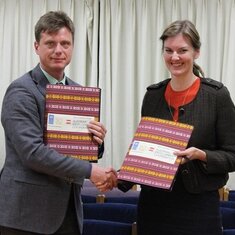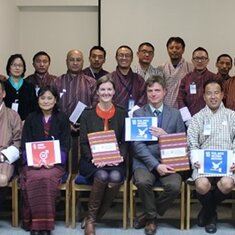Pagecontent
Justice for all
In November 2016, Bhutan has come one significant step closer to its objective of providing equal access to justice for every one of its citizens. The Austrian Development Agency (ADA) and the United Nations Development Programme (UNDP) signed an agreement at the UN Office in Kawajangsa to enhance equal access to justice for the country's most vulnerable groups. The joint programme foresees the development of an enabling legal and policy environment in Bhutan and addresses in particular the rights of the Bhutanese lesbian, gay, bisexual and transgender (LGBT) community, its women and people with disabilities or living with HIV. It will be effective from now on until 31 December 2018.
Partnerships and shared knowhow to reach SDG 16
Setting off a two-year cooperation, ADA and UNDP will focus on improving the rights of Bhutan's most vulnerable groups through a better coordinated and integrated justice sector. This will be achieved through multiple partnerships and trainings for selected staff, effective knowhow sharing and capacity development.
With their agreement, ADA and UNDP aim at effectively incorporating Sustainable Development Goal (SDG) number 16 - Peace, Justice and Strong Institutions - into the strategic plans of Bhutan's parliament and justice sector. Their cooperation is expected to reinforce the collaboration between state and non-state actors on all levels and, through this multitude of partnerships, build a peaceful and inclusive society, provide access to justice for all, and set up effective, accountable and inclusive institutions.
No one left behind
Johannes Binder, Head of the Austrian Development Agency's local office in Thimphu, accords high priority to the joint initiative: "It is a human-dignity centered programme, and will ultimately bring about inclusive participation in every field", Binder declared at the signing ceremony.
He pointed out that working with vulnerable groups has become an increasing necessity for Bhutan's government, its civil society organisations (CSOs) and development partners, as socio-economic transition was gaining speed across sectors, and not always in a regulated manner. These developments might put vulnerable groups' needs under even bigger constraints - hence ADA's delight about the realisation of the agreement.
Addressing the stakeholders of the project at the signing ceremony, UNDP Representative Niamh Collier-Smith pointed out that the agencies and institutions involved should now take a close look at what kind of support was needed specifically. Only this way could the vulnerabilities faced by Bhutan's most marginalised people be addressed in the best possible way. Collier-Smith was proud to add that the partnership not only focused on SDG 16 but also included the UN's commitment to leave no one behind.
Improving justice equality through trainings for inclusivity
Throughout the programme activities, state and CSO representatives will be trained on how to administer justice for vulnerable groups. This will primarily benefit women and LGBT persons as well as HIV positive or disabled people. CSOs' capacities of working with victims of domestic violence will be strengthened as well.
The agreement targets numerous actors, ranging from members of the Bhutanese Parliament and the Parliament Secretariat staff to employees of the Office of the Attorney General, judges and representatives of the Bhutan National Legal Institute as well as the Jigme Singye Wangchuck School of Law and the Royal Bhutan Police. Other target groups include representatives of CSOs and the National Commission for Women and Children. The programme will also involve the country's multi-sectoral Task Force for the Ratification of the United Nations Convention on the Rights of Persons with Disabilities (CRPD).
Both ADA and UNDP praised the joint efforts of Bhutan's executive and legislative branches as well as influential civil society representatives to build a more equal society. They also welcomed the active involvement of the Bhutanese judicative through the Austrian Development Cooperation legal sector programme, which is funded in parallel. The Austrian local office once again emphasised its readiness to provide support through Austrian contacts and by organising knowledge exchanges to share experiences on legislation, policies, and possible opportunities for cooperation.


